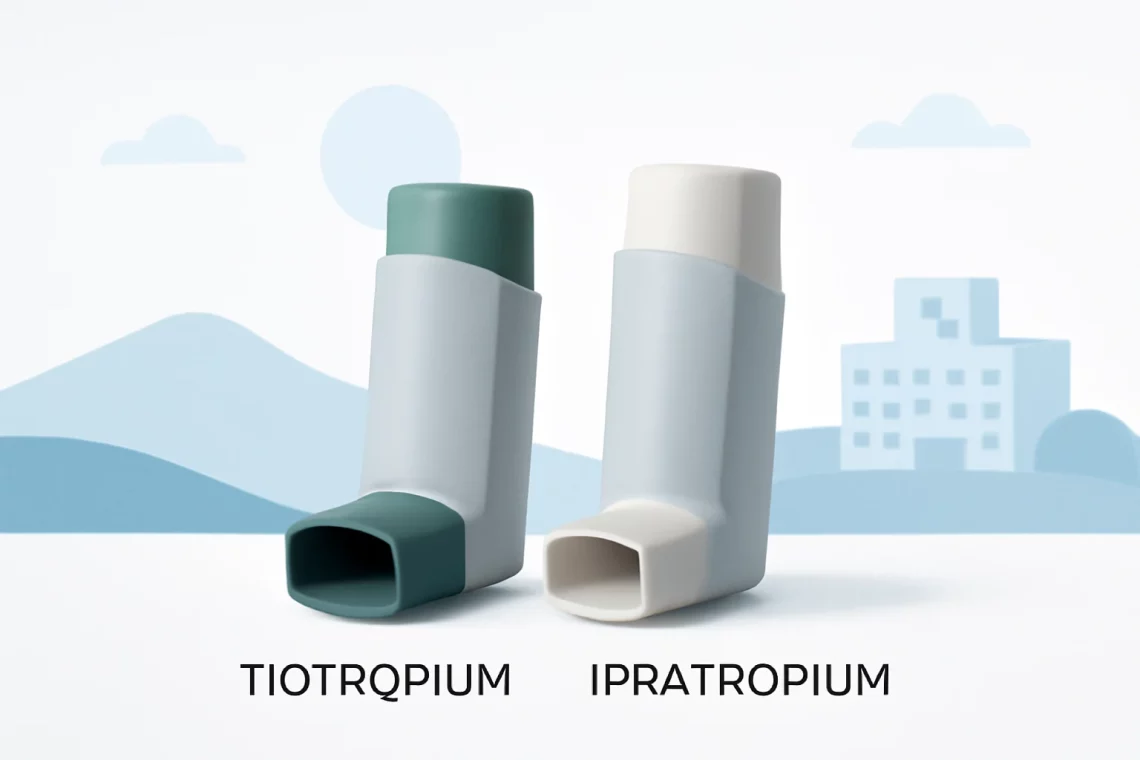-
Comparing Tiotropium and Ipratropium: Which is More Effective?
Tiotropium and ipratropium are both anticholinergic medications primarily used in the management of respiratory conditions, particularly chronic obstructive pulmonary disease (COPD) and asthma. These medications work by relaxing the muscles around the airways, leading to improved airflow and easier breathing. Despite their similar therapeutic effects, tiotropium and ipratropium differ in several key aspects, including their duration of action, dosing frequency, and specific indications. As respiratory diseases continue to affect millions worldwide, understanding the nuances between these medications is crucial for both patients and healthcare providers. In this article, we explore the characteristics of tiotropium and ipratropium, examining their mechanisms of action, clinical applications, side effects, and overall effectiveness in managing…
-
Comparing Tiotropium and Ipratropium: Which is Right for You?
The management of chronic respiratory conditions has evolved significantly over the years, with various medications playing pivotal roles in improving patients’ quality of life. Among these medications are bronchodilators, which are essential in alleviating symptoms associated with conditions like asthma and chronic obstructive pulmonary disease (COPD). Two commonly prescribed medications in this category are Tiotropium and Ipratropium. These drugs, while both classified as anticholinergic bronchodilators, have unique characteristics, mechanisms of action, and clinical applications. Understanding the differences between them is crucial for healthcare providers and patients alike in making informed decisions regarding treatment options. As the demand for effective respiratory therapies continues to rise, the significance of these medications cannot…
-
Prednisone vs Triamcinolone: Key Differences and Uses Explained
Prednisone and triamcinolone are both corticosteroids, widely used in the medical field to treat a variety of health conditions. These medications are synthetic derivatives of natural hormones produced by the adrenal glands, primarily responsible for regulating inflammation and immune responses in the body. While they share a common purpose in alleviating symptoms associated with inflammatory and autoimmune disorders, their specific applications, mechanisms of action, and side effects can differ significantly. The importance of understanding the differences between these two medications lies in their varying effectiveness for particular conditions, as well as their distinct side effect profiles. Patients and healthcare providers alike must navigate these differences to determine the most appropriate…
-
Montelukast vs Fluticasone: Which is Better for Allergies?
In recent years, the prevalence of asthma and allergic conditions has risen significantly, leading to an increased demand for effective treatments. Among the most frequently prescribed medications are Montelukast and Fluticasone. Both drugs are utilized to manage symptoms of asthma and allergic rhinitis, but they work through different mechanisms and have distinct profiles. Understanding the differences between these two medications can empower patients and healthcare providers to make informed decisions about asthma and allergy management. Montelukast is a leukotriene receptor antagonist that helps reduce inflammation in the airways, thereby alleviating symptoms such as wheezing, shortness of breath, and nasal congestion. On the other hand, Fluticasone is a corticosteroid that directly…
-
Albuterol vs Salbutamol: Understanding Their Differences and Uses
Albuterol and salbutamol are two medications widely used in the treatment of respiratory conditions, particularly asthma and chronic obstructive pulmonary disease (COPD). Both drugs serve as bronchodilators, which means they work by relaxing the muscles in the airways, allowing the airways to open up more fully, thereby easing breathing. Despite their similar functions, there are distinct differences between the two that can affect their usage, effectiveness, and overall patient experience. Understanding these differences is crucial for anyone managing a respiratory condition or considering treatment options. In the realm of respiratory medications, the choice often boils down to personal preference, specific health needs, and physician recommendations. Factors like how quickly the…



















